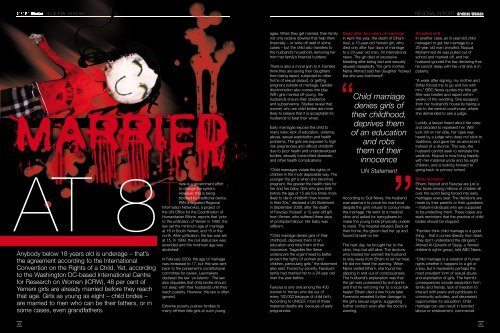Child marriage denies girls of their childhood, deprives ... - Go Dubai
Child marriage denies girls of their childhood, deprives ... - Go Dubai
Child marriage denies girls of their childhood, deprives ... - Go Dubai
Create successful ePaper yourself
Turn your PDF publications into a flip-book with our unique Google optimized e-Paper software.
REGIONAL REPORT<br />
REGIONAL REPORT<br />
MARRIED<br />
There is a government effort<br />
AT 8<br />
Anybody below 18 years old is underage – that’s<br />
the agreement according to the International<br />
Convention on the Rights <strong>of</strong> a <strong>Child</strong>. Yet, according<br />
to the washington DC-based International Centre<br />
for Research on women (ICRw), 48 per cent <strong>of</strong><br />
Yemeni <strong>girls</strong> are already married before they reach<br />
that age. Girls as young as eight – child brides –<br />
are married to men who can be <strong>their</strong> fathers, or in<br />
some cases, even grandfathers.<br />
to change the system.<br />
However, this is being<br />
blocked by traditional clerics.<br />
IRIN (Integrated Regional<br />
Information Networks), a project <strong>of</strong><br />
the UN Office for the Coordination <strong>of</strong><br />
Humanitarian Efforts, reports that ‘prior<br />
to the unification <strong>of</strong> Yemen in 1990, the<br />
law set the minimum age <strong>of</strong> <strong>marriage</strong><br />
at 16 in South Yemen, and 15 in the<br />
north. After unification, the law was set<br />
at 15. In 1999, the civil status law was<br />
amended and the minimum age was<br />
abolished’.<br />
In February 2009, the age <strong>of</strong> <strong>marriage</strong><br />
was increased to 17, but this was sent<br />
back to the parliament’s constitutional<br />
committee for review. Lawmakers<br />
declared the law ‘un-Islamic’. The law<br />
also stipulates that child brides should<br />
not sleep with <strong>their</strong> husbands until they<br />
reach puberty. However, this law is <strong>of</strong>ten<br />
ignored.<br />
Extreme poverty pushes families to<br />
marry <strong>of</strong>f <strong>their</strong> little <strong>girls</strong> at such young<br />
ages. when they get married, <strong>their</strong> family<br />
not only receive dowries that help them<br />
financially – or write <strong>of</strong>f debt in some<br />
cases – but the child also transfers to<br />
the husband’s household, removing her<br />
from her family’s financial burdens.<br />
There is also a moral spin to it. Families<br />
think they are saving <strong>their</strong> daughters<br />
from being raped, subjected to other<br />
forms <strong>of</strong> sexual assault, or getting<br />
pregnant outside <strong>of</strong> <strong>marriage</strong>. Gender<br />
discrimination also comes into play.<br />
with <strong>girls</strong> married <strong>of</strong>f young, the<br />
husbands ensure <strong>their</strong> obedience<br />
and subservience. Studies reveal that<br />
women who are child brides are more<br />
likely to believe that it is acceptable for<br />
husbands to beat <strong>their</strong> wives.<br />
Early <strong>marriage</strong>s expose the child to<br />
many risks: lack <strong>of</strong> education, violence,<br />
abuse, sexual exploitation and health<br />
problems. The <strong>girls</strong> are exposed to high<br />
risk pregnancies and difficult childbirth<br />
due to poor health and underdeveloped<br />
bodies, sexually transmitted diseases,<br />
and other health complications.<br />
“<strong>Child</strong> <strong>marriage</strong>s violate the rights <strong>of</strong><br />
children in the most deplorable way. The<br />
younger the girl is when she becomes<br />
pregnant, the greater the health risks for<br />
her and her baby. Girls who give birth<br />
before the age <strong>of</strong> 15 are five times more<br />
likely to die in childbirth than women<br />
in <strong>their</strong> 20s,” declared a UN Statement<br />
in September 2009, after the death<br />
<strong>of</strong> Fawziya Youssef, a 12-year-old girl<br />
from Yemen, who suffered three days<br />
<strong>of</strong> protracted labour. Her baby was<br />
stillborn.<br />
“<strong>Child</strong> <strong>marriage</strong> <strong>denies</strong> <strong>girls</strong> <strong>of</strong> <strong>their</strong><br />
<strong>childhood</strong>, <strong>deprives</strong> them <strong>of</strong> an<br />
education and robs them <strong>of</strong> <strong>their</strong><br />
innocence. Tragedies like these<br />
underscore the urgent need to better<br />
protect the rights <strong>of</strong> women and<br />
children, particularly <strong>girls</strong>,” the statement<br />
also said. Forced by poverty, Fawziya’s<br />
family had married her to a 24-year old<br />
man the year before.<br />
Fawziya is only one among the 430<br />
women in Yemen who die out <strong>of</strong><br />
every 100,000 because <strong>of</strong> child birth.<br />
According to UNICEF, most <strong>of</strong> these<br />
maternal deaths are because <strong>of</strong> early<br />
pregnancies.<br />
Dead after four days <strong>of</strong> <strong>marriage</strong><br />
In April this year, the death <strong>of</strong> Elham<br />
Assi, a 13-year-old Yemeni girl, who<br />
died only after four days <strong>of</strong> <strong>marriage</strong><br />
to a 23-year old man, hit international<br />
news. The girl died <strong>of</strong> excessive<br />
bleeding after being tied and sexually<br />
abused repeatedly. The girl’s mother,<br />
Nijma Ahmad said her daughter “looked<br />
like she was butchered”.<br />
<strong>Child</strong> <strong>marriage</strong><br />
<strong>denies</strong> <strong>girls</strong> <strong>of</strong><br />
<strong>their</strong> <strong>childhood</strong>,<br />
<strong>deprives</strong> them<br />
<strong>of</strong> an education<br />
and robs<br />
them <strong>of</strong> <strong>their</strong><br />
innocence<br />
UN Statement<br />
According to Gulf News, the husband<br />
was adamant to prove his manhood<br />
despite the girl’s refusal to consummate<br />
the <strong>marriage</strong>. He went to a medical<br />
clinic and asked for tranquilisers to<br />
make the young bride physically unable<br />
to resist. The hospital refused. Back at<br />
<strong>their</strong> home, the groom tied her up and<br />
forced himself on her.<br />
The next day, he brought her to the<br />
clinic, limp but still alive. The doctors<br />
who treated her warned the husband<br />
to stay away from Elham to let her heal.<br />
He did not heed the warning. when<br />
Nijma visited Elham, she found her<br />
slipping in and out <strong>of</strong> consciousness.<br />
The husband’s explanation was that<br />
the girl was possessed by evil spirits<br />
and that he will bring her to a local folk<br />
healer. Elham died a few hours later.<br />
Forensics revealed further damage to<br />
the girl’s sexual organs, suggesting<br />
further contact even after the doctor’s<br />
warning.<br />
Annulled at 8<br />
In another case, an 8-year-old child<br />
managed to get her <strong>marriage</strong> to a<br />
20-year old man annulled. Nojoud<br />
Mohammed Ali was pulled out <strong>of</strong><br />
school and married <strong>of</strong>f, and her<br />
husband ignored the law declaring that<br />
he cannot sleep with her until she is in<br />
puberty.<br />
“A week after signing, my mother and<br />
father forced me to go and live with<br />
him,” BBC News quotes the little girl.<br />
She was beaten and raped within<br />
weeks <strong>of</strong> the wedding. She escaped<br />
from her husband’s house by taking a<br />
cab to the central courthouse, where<br />
she demanded to see a judge.<br />
Luckily, a lawyer heard about her case<br />
and decided to represent her. with<br />
luck still on her side, her case was<br />
heard by a judge who does not stick to<br />
traditions, and gave her an annulment<br />
instead <strong>of</strong> a divorce. This way, the<br />
husband cannot seek to reinstate the<br />
wedlock. Nojoud is now living happily<br />
with her maternal uncle and his eight<br />
children, and is looking forward to<br />
going back to primary school.<br />
Stark reminder<br />
Elham, Nojoud and Fawziya are just a<br />
few faces among millions <strong>of</strong> children all<br />
over the world being forced into early<br />
<strong>marriage</strong>s every year. The decisions are<br />
made by <strong>their</strong> parents or <strong>their</strong> guardians<br />
– mature individuals who are supposed<br />
to be protecting them. These cases are<br />
stark reminders that the practice <strong>of</strong> child<br />
brides should be stopped.<br />
“Families think child <strong>marriage</strong> is a good<br />
thing… that it comes directly from Islam.<br />
They don’t understand the dangers,”<br />
Ahmad Al-Qureishi <strong>of</strong> Seyaj, a Yemeni<br />
children’s rights group, told ABC News.<br />
“<strong>Child</strong> <strong>marriage</strong> is a violation <strong>of</strong> human<br />
rights whether it happens to a girl or<br />
a boy, but it represents perhaps the<br />
most prevalent form <strong>of</strong> sexual abuse<br />
and exploitation <strong>of</strong> <strong>girls</strong>. The harmful<br />
consequences include separation from<br />
family and friends, lack <strong>of</strong> freedom to<br />
interact with peers and participate in<br />
community activities, and decreased<br />
opportunities for education. <strong>Child</strong><br />
<strong>marriage</strong> can also result in bonded<br />
labour or enslavement, commercial<br />
42<br />
43
REGIONAL REPORT<br />
According to<br />
UNICEF, women<br />
with primary<br />
education are<br />
significantly<br />
less likely to<br />
be married or<br />
in union as<br />
children, than<br />
those without<br />
education<br />
ADVERTISEMENT<br />
Source: BBC News, Unicef.org, IRIN, ICRW AND GULF NEWS<br />
sexual exploitation and violence against<br />
the victims. Because they cannot<br />
abstain from sex or insist on condom<br />
use, child brides are <strong>of</strong>ten exposed to<br />
such serious health risks as premature<br />
pregnancy, sexually transmitted<br />
infections and, increasingly, HIV/<br />
AIDS,” reads a UNICEF child protection<br />
information sheet.<br />
<strong>Go</strong>vernments should also have clear<br />
punishment systems for rapists<br />
and sex <strong>of</strong>fenders and enforce it.<br />
Getting raped or sexually abused<br />
is one <strong>of</strong> parents’ fears and reason<br />
for marrying <strong>of</strong> <strong>their</strong> children young.<br />
<strong>Child</strong> <strong>marriage</strong>s may be a family’s<br />
solution to financial obligations, but<br />
the practice itself enforces the cycle <strong>of</strong><br />
poverty. Rearing children well, giving<br />
them proper education and enhancing<br />
<strong>their</strong> knowledge and skills through<br />
government, non-government and<br />
private or civil programmes would allow<br />
them to grow up productive members<br />
<strong>of</strong> society.<br />
Ending the practice <strong>of</strong> child <strong>marriage</strong>s<br />
is going to be difficult, but it is possible<br />
with awareness and dedication. Studies<br />
have proven that there is a direct<br />
co-relation between education and the<br />
number <strong>of</strong> women being entered into<br />
child <strong>marriage</strong>s. According to UNICEF,<br />
women with primary education are<br />
significantly less likely to be married or<br />
in union as children, than those without<br />
education. <strong>Go</strong>vernments should also<br />
see to it that laws are passed enforcing<br />
that 18 years old as the legal and<br />
acceptable <strong>marriage</strong>able age for both<br />
men and women. NGOs, parents,<br />
individuals and the society as a whole<br />
should also be more vigilant and lobby<br />
for such developments to ensure that<br />
children’s rights are observed.<br />
Painful facts<br />
• 7 per cent <strong>of</strong> <strong>girls</strong> in Nepal are<br />
married before 10 years old, 40<br />
per cent are married before 15<br />
• 29 per cent <strong>of</strong> young brides<br />
in Egypt are beaten by <strong>their</strong><br />
husbands or relatives<br />
• Highest cause <strong>of</strong> mortality <strong>of</strong> <strong>girls</strong><br />
from 15-19 years old worldwide<br />
are pregnancy-related<br />
• Extreme cases <strong>of</strong> child <strong>marriage</strong>s<br />
occur in Democratic Republic<br />
<strong>of</strong> Congo, Afghanistan and<br />
Bangladesh<br />
• 60 million women worldwide were<br />
wed before they were 18 years<br />
old, half <strong>of</strong> which live in South Asia<br />
44







